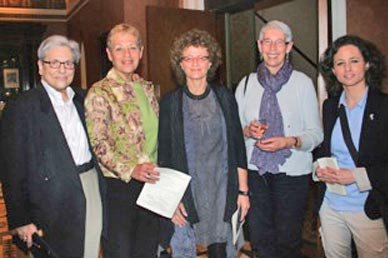Late last year the board of Rodeph Shalom unanimously voiced its support for marriage equality — and the synagogue and its LGBT congregation are gearing up for more pro-LGBT efforts.
Congregation Beth Ahavah, based out of Rodeph Shalom, will next week launch a discussion program focusing on LGBT interpretation of the Torah.
The LGBT congregation was founded in 1975 and aligned itself with Rodeph Shalom in 2007.
Rodeph Shalom director of membership and programming Catherine Fischer said the recent marriage-equality resolution that the board approved illustrates its ongoing support for Beth Ahavah.
“This was something Beth Ahavah had brought to the attention of our leadership and we felt strongly that this was something we should do,” Fischer said. “BA is part of RS and RS is part of BA, and we thought it was a no-brainer to bring us all together with this and rally around this important issue.”
Fischer said the synagogue is also looking to put that declaration of support into action.
Leaders within RS and BA met this week to explore ways to advocate for marriage equality and other LGBT-rights issues in the area.
“We want to work with other groups in the city and be a team player,” Fischer said. “We’re looking at how we can partner with other Reform congregations and other groups to advocate around this issue. We want to hear from individuals interested in marriage-equality initiatives and talk about how we can unfold this to the rest of the community.”
Another new initiative is “Torah Queeries,” which will kick off at 7 p.m. March 6 at the synagogue, 615 N. Broad St., and will be followed by another forum April 23.
The event is free and open to the public.
BA president Joan Levin said the discussion group grew out of the book of the same name, which presented a host of LGBT and ally writers looking at the Torah through a modern queer lens.
Levin said she found a number of other congregations throughout the country that had started similar groups and was eager to bring the discussion to Philadelphia’s LGBT Jewish community.
“Sometimes when you’re studying a part of the Torah, you’re also studying commentaries over many, many centuries. Interpretations change over time, and the possibility of change is built into Judaism,” Levin said, noting that the rise of feminism several decades ago paved the way for discussions on new interpretations of the Torah, continued by the LGBT movement. “This has been a growing thing and what ‘Torah Queeries’ does is basically use its own lens of LGBT issues to look at the Torah and make interpretations of what it means in terms of our world today.”
Levin noted that, while some factions of Judaism are resistant to embracing the LGBT community, Judaism in general is intrinsically pro-equality.
“Social justice, repairing the world — they’re very important aspects of Judaism. It’s in many ways our job to do that, and you can find the basis for that right in the Torah: ‘Be a light unto the nations.’ This is very much based in our history and to not include LGBT people would be the wrong thing to do,” she said. “It’s taken time for LGBT acceptance but it is happening more and growing, even though there are still problems in terms of Orthodox Jews. But this whole path is very, very important. Judaism has always had an ability to change, to expand itself. So we thought it would be enriching for BA to participate in this.”
Levin said when BA brought up the idea to RS leadership, they were met with immediate support.
The program will be led by Jessica Rosenberg, an instructor at RS Confirmation Academy and student at the Reconstructionist Rabbinical College.
“In these sessions we will dig deep into the Torah, our oldest sacred text, using some of the freshest, most relevant perspectives to our lives as LGBT people,” Rosenberg said. “By reading the Torah, studying contemporary commentaries and bringing our own life experiences to both, we’ll start to create our own Torah Queeries together.”
Fischer said “Torah Queeries” and the congregation’s marriage-equality push both allow RS to remain in tune and in step with the needs of the local LGBT Jewish community.
“We’re really excited about growing opportunities and being at the forefront of strengthening the community here, and it’s a very diverse community,” she said. “We’re excited to roll up our sleeves and make sure the community has the respect and rights they need. This isn’t just a gay issue; for us, it’s a community issue.”
For more information on “Torah Queeries,” email [email protected].

